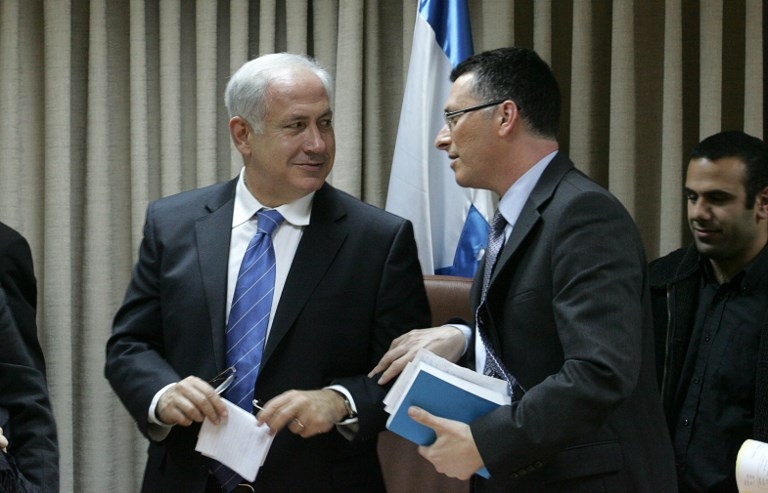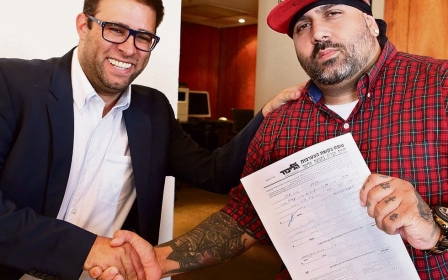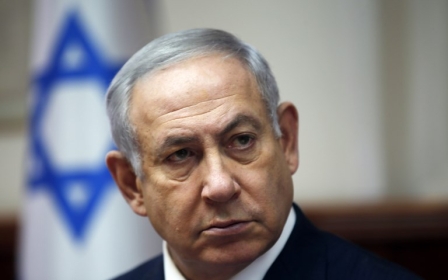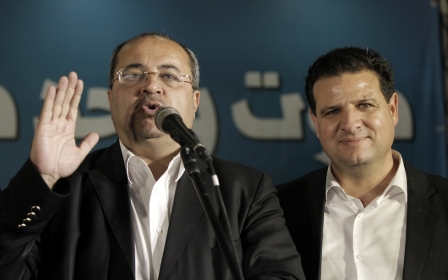Likud primary: Fierce battle for party's top spots in upcoming Israeli elections

Knesset Speaker Yuli Edelstein, Transportation Minister Israel Katz, Public Security Minister Gilad Erdan and former interior minister Gideon Saar have taken the top spots in the Likud ticket four this April's election.
With all 587 ballot boxes counted on Wednesday, Edelstein received the most votes, followed by Katz, Erdan and then Saar.
On Tuesday, 58 percent of the 120,000 eligible Likud members had turned out to elect candidates for positions in the ruling party's slate.
With 142 candidates far outnumbering the 30 available slots, the election was fiercely contested, and widely seen as a litmus test of Likud leader and embattled Prime Minister Benjamin Netanyahu’s control of the party.
As party chairman, Netanyahu will automatically hold the first slot on the party's slate.
Stay informed with MEE's newsletters
Sign up to get the latest alerts, insights and analysis, starting with Turkey Unpacked
While Netanyahu’s position as leader of the right-wing party was not up for a vote, the candidacy of several heavyweight Likud veterans fuelled what some candidates described as an “internal conflict within the family”.
Saar wars
On Sunday evening, Netanyahu released a video on the Likud TV channel on Facebook, encouraging party members to vote.
But unlike his election video in 2015, Netanyahu did not warn against Arab voters “coming out in droves” this time. Rather, he warned of a completely different danger: Gideon Saar.
'His goal is clear: to try and hurt me in the primaries... I will not be dragged into an internal war'
- Gideon Saar
In September 2014, after his son David was born, Saar started what would be a nearly five-year hiatus telling Likud members he wanted “privacy, quiet, freedom and to spend more time at home”.
Saar, a lawyer, is widely believed to be Netanyahu's natural successor, a strong competitor for the future leadership of Likud, and an eventual prime minister.
In Israel, the president decides who will assemble the next government, usually the person who receives the most votes. But sometimes, the president assigns the task to the next appropriate person.
Netanyahu and his associates have played up this potential anomaly over the past few days, suggesting that Saar made a deal with President Reuven Rivlin to ask him, not Netanyahu, to form the next government.
Netanyahu insinuated the deal once again on Tuesday, reportedly saying that he would not retract even a syllable of his remarks.
Rivlin and Saar both denied the accusation. Earlier this week, Saar tweeted: “Unfortunately, two days before the primaries, the prime minister has chosen to try and recycle a made-up story he put out a few months ago. His goal is clear: to try and hurt me in the primaries... I will not be dragged into an internal war".
'Greater Israel'
In addition to Saar, there were several other familiar faces among primary candidates, and some new ones as well.
Erdan, who has held several ministerial positions and currently serves as public security minister, has been a prime mover behinds plans to ease restrictions to obtain gun ownership permits, which would make hundreds of thousands of additional Israeli civilians eligible to carry a firearm.
Edelstein, the speaker of the parliament, is considered one of Likud's most prominent members and won second place in the previous primary.
He has initiated a law prohibiting the abandonment of animals and promoted the environmental transformation of the Israeli parliament.
Tourism Minister Yariv Levin, who came seventh position in Wednesday's count, broke the Israeli record for the number of proposed bills approved in one term and is considered a right-wing hardliner.
He believes in “Greater Israel” and strongly opposes the establishment of a Palestinian state. During his term as minister, a new record of tourists visited Israel.
Nir Barkat, former mayor of Jerusalem, finished one place behind Levin in the count.
A member of the Central Party in 2012, Barkat published his plan for the transfer of East Jerusalem neighbourhoods to the administration of the Palestinian Authority and, at the same time, promoted the construction of housing units in a nearby Jewish neighbourhood.
He is seen as a relative liberal with a moderate political outlook.
'New Likudniks'
Miri Regev, minister of culture and sport, former chief censor of the Israeli army and spokeswoman during the Israeli withdrawal from the Gaza Strip in 2005, and the 2006 war on Lebanon, came sixth in the vote – one slot down from her current showing.
Regev is known for her extreme statements and her "loyalty in culture" law, which requires allegiance to Israel in exchange for funding for cultural activities.
She has also made provocative, inciting statements about left-wing Israeli parties while at the same time saying that “white hegemony” in the country - referring to Jewish Israelis of European descent -has alienated Israelis of North African descent from holding positions of power.
Her term in the ministry of culture was characterised by newspaper headlines, an increase in the cultural budget and disruption of the Israeli cultural scene.
Regev visited southern Tel Aviv - a neighbourhood where many African asylum seekers reside - on Tuesday morning, and wrote on Twitter: "After the Sudanese conquered southern Tel Aviv, now the 'New Likudniks' are occupying southern Tel Aviv. They represent the left-wing and try to harm and change the DNA of our party".
The "New Likudniks" Regev was referring to, a group founded in 2011 to promote liberal and secular discourse in the party, were also running on Tuesday.
Candidates included Barkat and Edelstein, as well as Tzachi Hanegbi, a Likud veteran, and Nurit Koren.
A significant portion of the Likud frontrunners - including Katz, Edelstein, Levin, Erdan, Regev and Hanegbi - signed a declaration overnight Tuesday pledging to support a plan expanding Israeli settlements in the occupied Palestinian territory to a population of two million settlers - up from an estimated 600,000 Israelis currently living in the occupied West Bank and East Jerusalem in contravention of international law.
Middle East Eye delivers independent and unrivalled coverage and analysis of the Middle East, North Africa and beyond. To learn more about republishing this content and the associated fees, please fill out this form. More about MEE can be found here.




